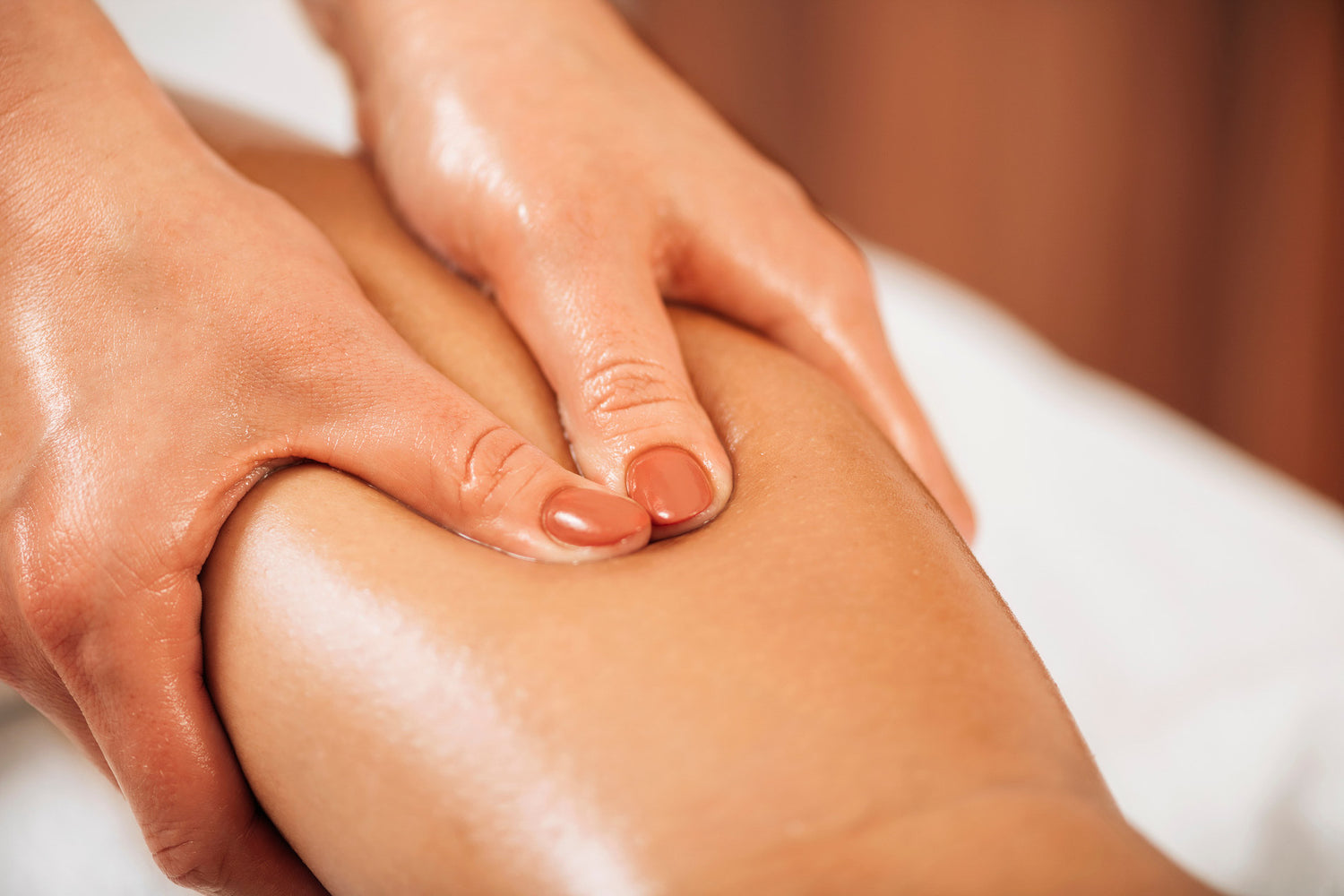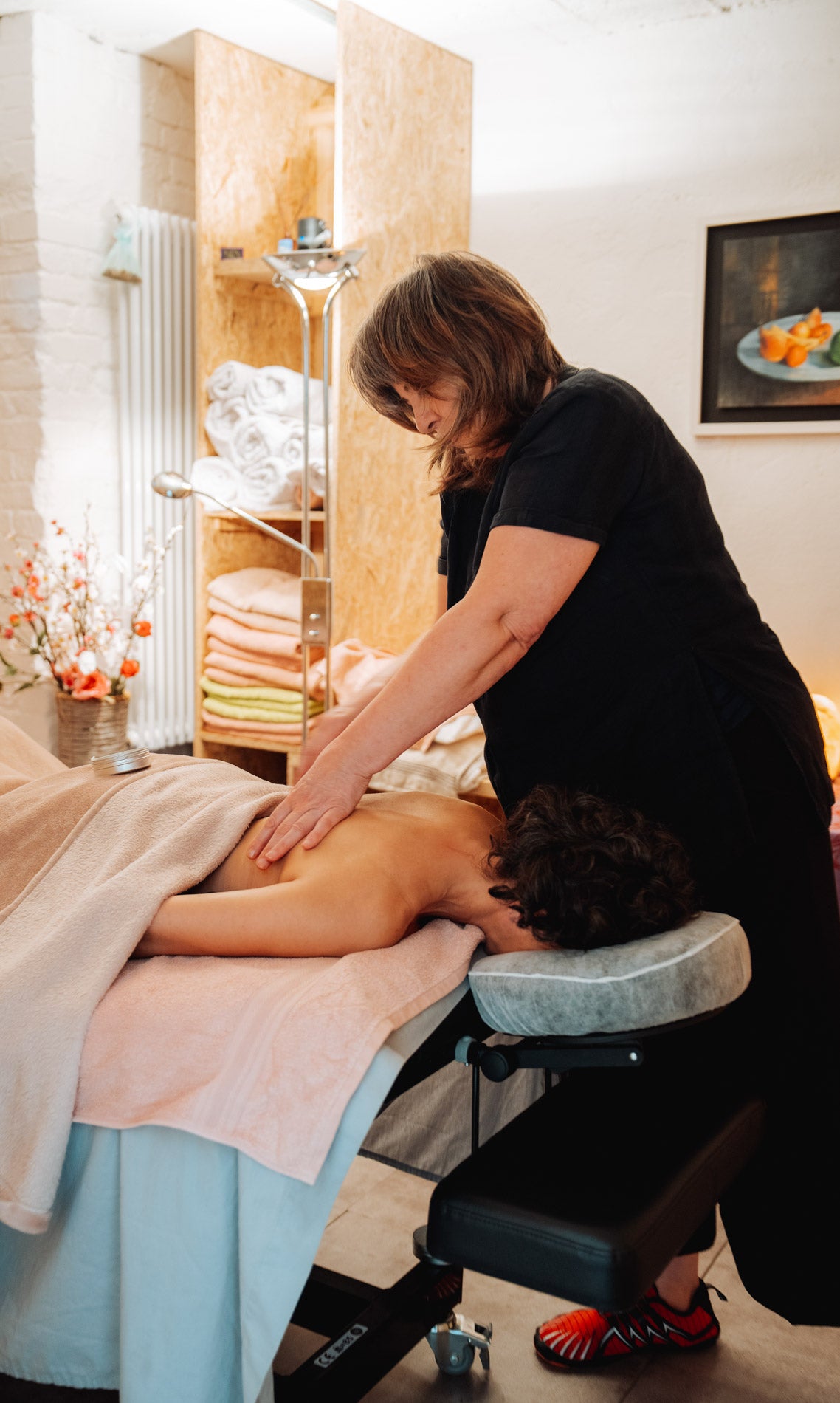
Deep Tissue Massage in Plymouth
Deep Tissue Massage can ease many chronic pain conditions and acute pain from sports injuries or minor muscle injuries.
A Deep Tissue Massage involves working deeper into the inner layers of muscles and connective tissue to release tension, adhesions, tightness, or pain held deep within the muscle and fascia (connective tissue).
Deep Tissue Massage
As a Massage Therapist and complementary Health Specialist in Plymouth, I work alongside conventional medicine or as an alternative practitioner to help you achieve your best well-being, with aromatherapy and other oils enhancing your therapy experience.
During a Deep Tissue Massage, prolonged gentle pressure is applied to an area to release the fascia (the delicate tissue surrounding bodily structures, including muscles and nerves). This releases restrictions such as trigger points and muscle tightness in soft tissue that may cause pain and limit motion in all parts of the body.
Increased blood flow occurs during the massage, which may assist in faster healing and reduce inflammation. Massage also often makes you feel more flexible by reducing the tightness of the muscles, fascia, and tendons.

What happens during a Deep Tissue Massage?
When you have a deep tissue massage, your treatment will likely follow a similar structure to this:
Consultation: Before your deep tissue massage begins, you’ll meet with your Massage Therapist to discuss your aims. What do you want to achieve from the massage? Do you have any particular trouble spots you want them to target?
Muscle preparation: The first part of the massage is gentle. The therapist will not go straight in with firm pressure. Instead, they will slowly build the pressure to warm your muscles.
Start of the deep tissue massage: Your therapist will increase the pressure and target the deep muscles and connective tissues. If the pressure is too firm for you, just let your therapist know.

Does a Deep Tissue Massage hurt?
A deep tissue massage shouldn’t hurt, but it may sometimes cause a small amount of discomfort as it isn’t a soft and gentle massage. However, that’s where communication with your therapist comes in.
You can help yourself by focusing on your breathing and remembering to communicate with your therapist. They can ease the pressure and allow you to relax briefly before resuming with slightly less pressure.
It’s vital to let your therapist know if you’re too uncomfortable or if the level of pressure is a bit too much for you. Please don’t suffer in silence!
It may hurt more when your therapist focuses on your trouble spots. Scar tissue is being loosened, and muscles are being moved around to where they should be.
What can a Deep Tissue Massage help with?
-
Arthritis
If you struggle with arthritis, deep tissue massage may help reduce the inflammation around the joints and, therefore, pain.
Injury Prevention
Anyone who regularly competes in a sport or trains may find that regular deep tissue massage can reduce the risk of injury.
Deep relaxation
Any massage, even deep tissue massage, helps the body to release hormones such as serotonin and dopamine, which help you to feel calm and relaxed.
Improved performance
Deep tissue massage increases range of motion, tissue flexibility and muscle relaxation, which all help improve performance across various sports and activities.
Of course, you may not notice the effects overnight, but hopefully, now you know that a deep-tissue massage is good for you!Better Sleep
Pain relief and serotonin release contribute to improved sleep.
-
Pain Relief
Deep tissue massage is effective for sports injuries, plantar fasciitis, sciatica, and fibromyalgia. It provides pain relief by releasing tension and promoting healing.
Healing
Increased blood flow reduces inflammation and speeds up healing.
Lower Blood Pressure
Studies show that massage can lower blood pressure.
Improved Flexibility
Enhances range of motion in tight muscles.
Relaxation
Deep tissue massage boosts the release of feel-good hormones (dopamine, serotonin, and endorphins), promoting relaxation.
Scar Tissue Breakup
Helps release tension caused by scars, improving flexibility in the affected area.
Are there any side effects of a Deep Tissue Massage?
It’s possible that after your massage, you might feel a little sore in the spots your therapist worked on the most. However, it shouldn’t hurt.
For most people, the most troublesome after effects of a deep tissue massage are wanting to go to sleep and feeling a little thirsty. These are things that are very easily fixed!
You may also experience a headache after the massage, but the best thing to do is drink water and lie down for a while. The effects should soon pass.
Aside from these side effects, the plus point is that you will certainly get a good night’s sleep, and you might even notice that you feel a little more upbeat and positive — all thanks to those feel-good hormones being released.
How much does a Deep Tissue Massage in Plymouth cost?
One hour
£60
90 mins
£85
Two hours
£110
Delia is highly trained, insured, and qualified in a host of holistic massage therapies, including clinical aromatherapy, clinical reflexology, osteopathic techniques, and manual lymphatic drainage. She is also regulated by the Federation of Holistic Therapists (FHT).
KIND Holistic Health and Massage
To book Deep Tissue Massage in Plymouth, with Delia or Ruby please get in touch using the button below, or email me at delia@kindallover.co.uk.
Contact Me